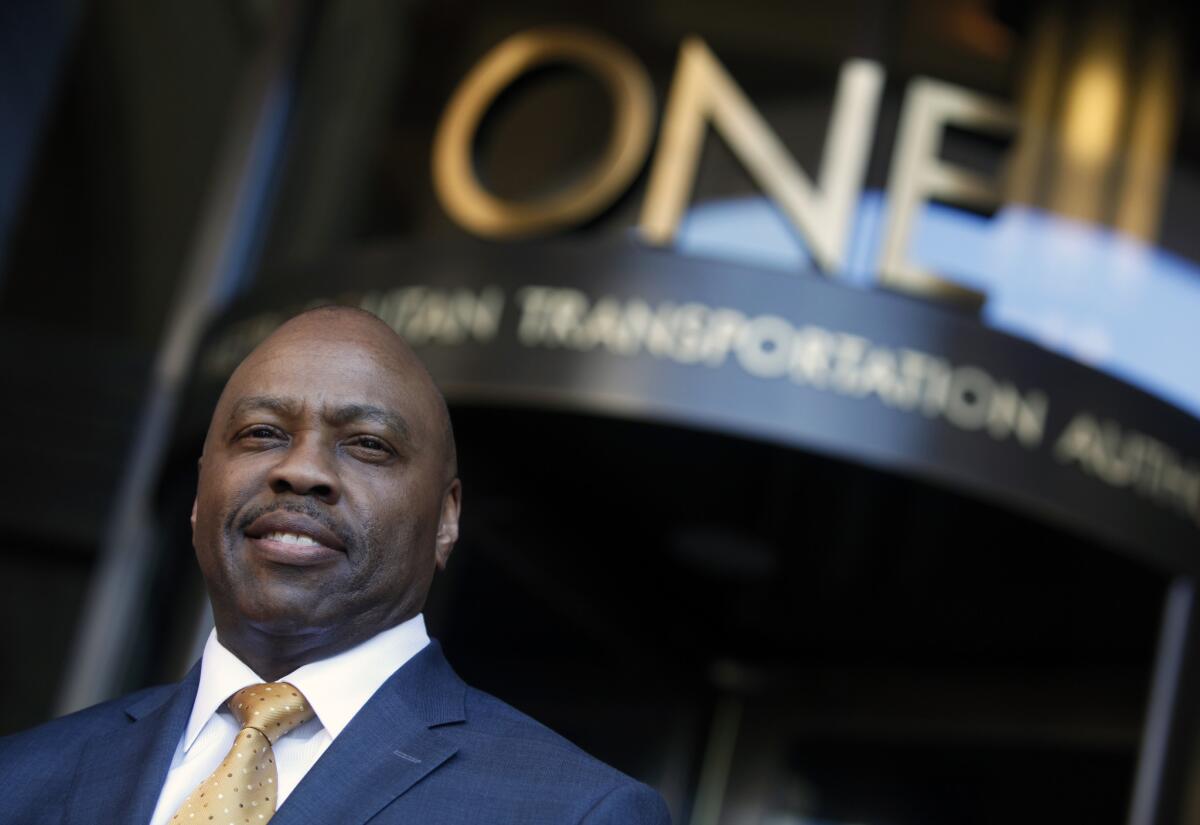Top Denver transit official will lead MTA in next phase of rail-building

- Share via
Los Angeles County transportation officials on Thursday chose the leader of Denver’s transit agency to guide the Metropolitan Transportation Authority through the next phase of a multibillion-dollar expansion of its rail system and efforts to eliminate projected budget shortfalls in coming years.
In a 11 to 0 vote, with two members absent, Metro’s board of directors approved hiring Phillip Washington, who has spent 16 years with Denver’s Regional Transportation District, including six years as general manager.
Washington replaces Art Leahy, who announced in January he would step down after six years as Metro’s chief executive.
“We can further transform this county and this region through transportation infrastructure investment, and that is what I look forward to doing,” Washington said at a press conference Thursday outside Metro headquarters in downtown Los Angeles. “I am really happy to be here, and honored that you are bestowing this great responsibility on me.”
Washington comes to Metro at a crucial time for the agency, which is in the midst of a multibillion-dollar rail-building boom that has the potential to reshape the face of commuting habits, development and density levels in traffic-choked Los Angeles. Nearly a decade after voters approved a half-cent sales tax increase for transportation improvements, Metro is simultaneously building five rail lines and is in the early stages of drafting another proposed levy that could fund a dozen more projects.
Washington said he will prioritize a “clean, efficient, reliable, accessible and cost-effective service” for riders, and be “laser-focused” on delivering projects on time and on budget, including the Crenshaw Line, the Downtown Regional Connector and the Purple Line extension under Wilshire Boulevard.
“He is here to bring this county together, to make it more mobile for our goods and our people,” said John Fasana, a Metro board member and a councilman from Duarte. “We are extremely excited to have him here. He’ll be a great leader for the riding public.”
Washington will supervise a fleet of more than 2,200 buses and 300 trains, which cover more than 1,400 miles of Los Angeles County.
“Here in the car capital of the world, we are changing things,” said Los Angeles Mayor Eric Garcetti, who is the chair of the Metro board. As Los Angeles tries to move more residents out of their cars and onto public transportation, Washington is the “right person to lead that vision forward,” Garcetti said.
The agency faces some financial concerns, including a projected deficit of $83 million in 2018, which could worsen to $248 million by 2023 as pension costs rise and new rail lines begin operating. In the last five years, the share of operational costs covered by fares has fallen from 29% to 26%, one of the lowest rates of any major transit agency in the world.
In Denver, Washington secured more than $1 billion in federal grants for transit expansion. Much like Leahy, he managed an agency in the midst of a multibillion-dollar expansion. A decade ago, Colorado voters approved a sales tax to build 140 miles of rail and bus rapid-transit service. Next year, RTD will cut the ribbon on four new rail lines and a bus rapid-transit line.
Washington was the front-runner during the search for the next chief executive, and was courted by Garcetti’s office for nearly a year, with an aide making at least one visit to Denver to meet with him, sources familiar with the process said. Garcetti spoke with Washington over the phone and met with him in person the week after Leahy announced his resignation, according to the mayor’s public calendars.
Washington also oversaw Denver’s first public-private partnership for transit, a $2.2-billion commuter rail network that will be built, paid for and operated by a private company. That made him a strong candidate for the Metro job, sources said, because Los Angeles County may seek private-sector financing for some of its more ambitious projects, including the Sepulveda Pass tunnel.
Washington will earn at least $326,789 annually, but the full details of his contract are not yet available, a Metro spokesman said. In Denver, Washington’s total compensation was $350,000 annually, including salary and benefits, according to his contract. He will start by May 29.
Leahy’s contract with Metro expires April 5. He is considered the front-runner to lead Metrolink, Southern California’s troubled commuter rail agency.
For more Los Angeles transportation news, follow @laura_nelson on Twitter.
More to Read
Sign up for Essential California
The most important California stories and recommendations in your inbox every morning.
You may occasionally receive promotional content from the Los Angeles Times.














